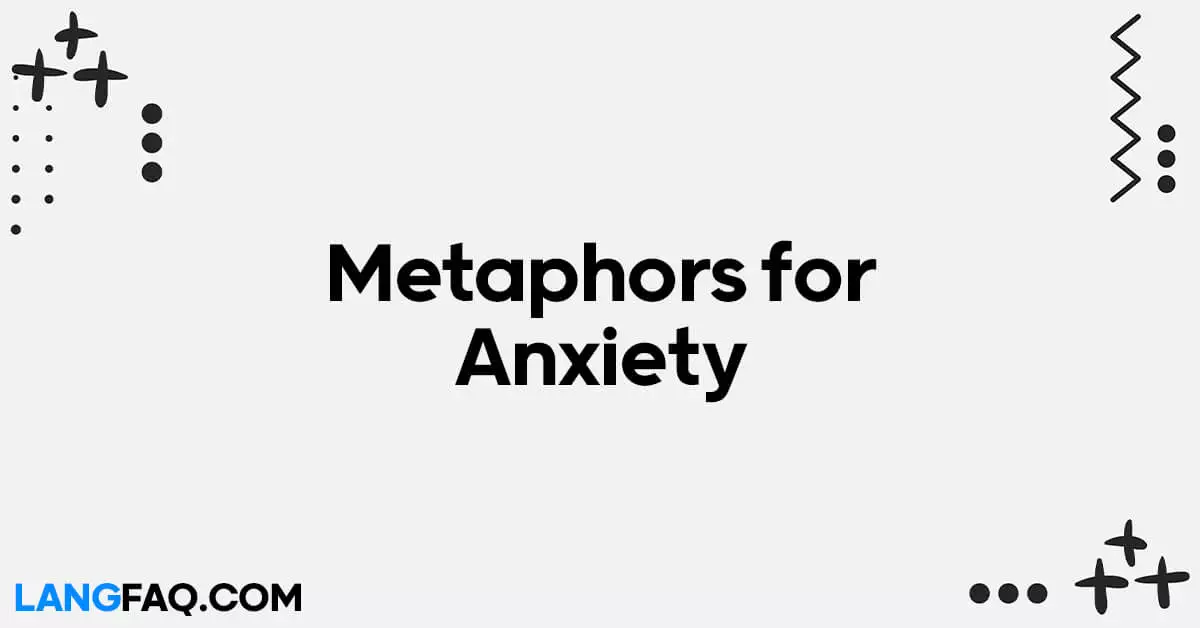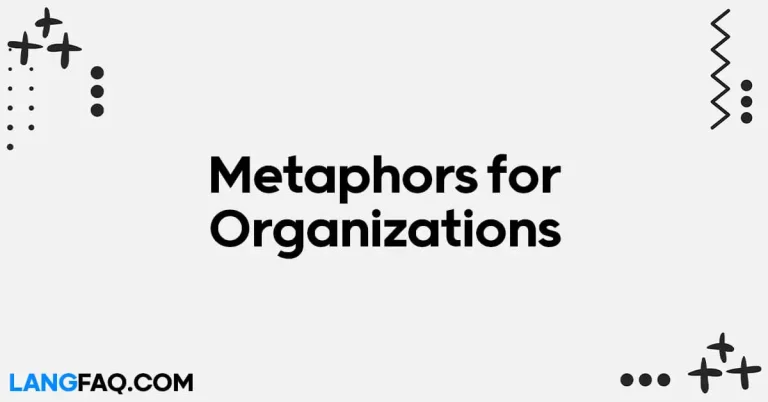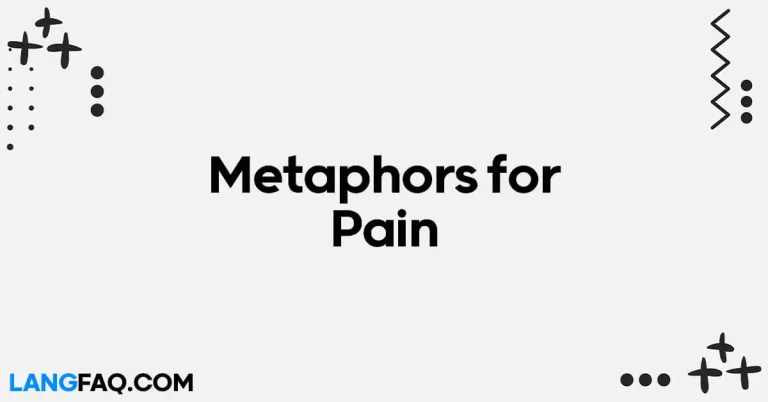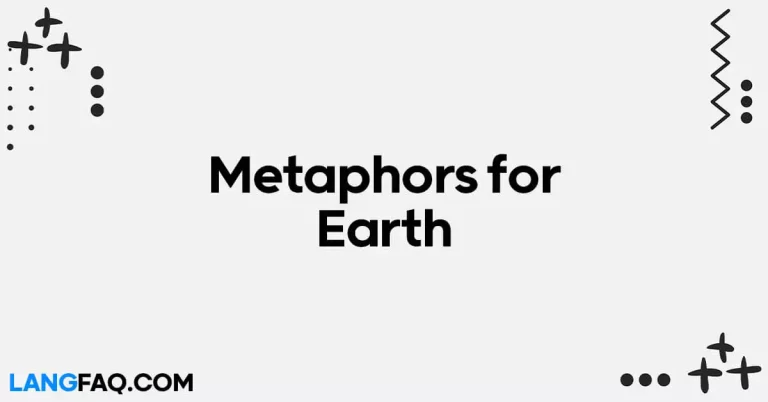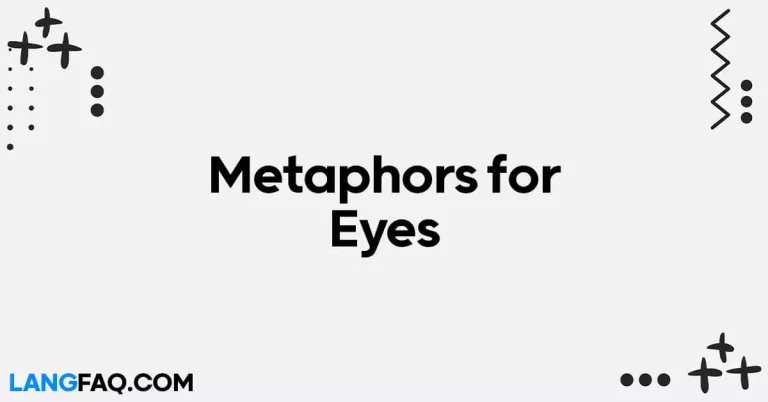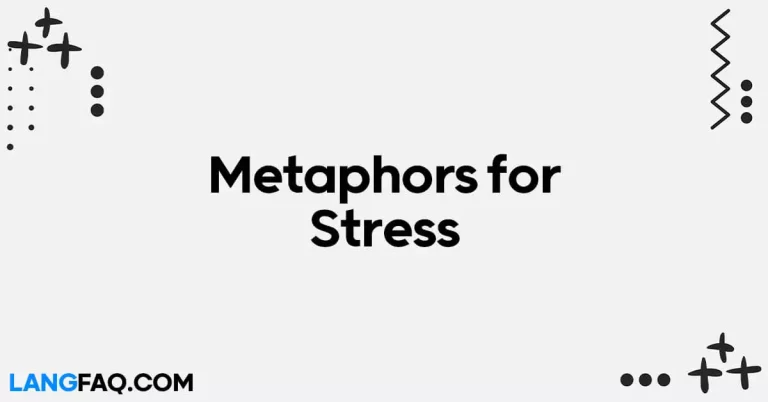Anxiety is a prevalent emotion that affects people of all ages and backgrounds. It’s essential to understand and manage it effectively to lead a fulfilling life. Metaphors can be powerful tools for grasping complex emotions. In this article, we’ll explore 26 vivid metaphors that encapsulate the essence of anxiety, helping you gain deeper insights and strategies for coping.
26 Metaphors for Anxiety
- A Stormy Sea: Anxiety is like a turbulent and unpredictable ocean, with emotions crashing like waves.
- The Overbearing Shadow: It’s akin to a looming shadow that follows you, obscuring the brightness of life.
- The Endless Carousel: Anxiety can feel like a never-ending carousel, constantly spinning with worries.
- The Weighted Backpack: Picture anxiety as a heavy backpack filled with worries and what-ifs, making every step a struggle.
- The Racing Thoughts: It’s like a whirlwind of thoughts racing through your mind, making it hard to focus.
- The Tightrope Walk: Navigating life with anxiety is like walking on a tightrope, constantly striving for balance.
- The Broken Record: Anxiety can be like a broken record, replaying worries on an endless loop.
- The Noisy Neighbor: Imagine anxiety as a noisy neighbor who never stops talking, drowning out everything else.
- The Stormy Weather: Anxiety is like a relentless storm, with thoughts and emotions crashing like thunder and lightning.
- The Maze of Uncertainty: Navigating anxiety can feel like wandering through an intricate maze with no clear path.
- The Persistent Alarm: It’s like a persistent alarm that goes off at unexpected times, jolting you from tranquility.
- The Heavy Burden: Picture anxiety as a heavy burden on your shoulders, making each step a struggle.
- The Tangled Knot: Anxiety can create a tangled knot of thoughts and emotions that seem impossible to unravel.
- The Racing Heartbeat: It often manifests as a racing heartbeat, as if your body is in a constant state of alarm.
- The Shattered Glass: Imagine anxiety as shattered glass, with each shard representing a different worry.
- The Endless Waiting Room: Anxiety can feel like waiting endlessly in a doctor’s office, your mind racing with uncertainty.
- The Invisible Chains: Picture anxiety as invisible chains that bind you, limiting your freedom.
- The Choking Fog: Anxiety can be like a choking fog, obscuring your vision and making it hard to breathe.
- The Juggling Act: Navigating life with anxiety can feel like a constant juggling act, trying to keep all your worries in the air.
- The Broken Compass: It’s like a broken compass, leaving you feeling lost and disoriented.
- The Restless Sea: Anxiety is like a restless sea, with waves of unease constantly crashing.
- The Intrusive Visitor: Picture anxiety as an intrusive visitor who overstays their welcome, disrupting your peace.
- The Quicksand Trap: Anxiety can be like quicksand, pulling you deeper with each struggle.
- The Maze of Mirrors: Navigating anxiety can feel like wandering through a maze of mirrors, each reflection distorting reality.
- The Endless Staircase: Imagine anxiety as an endless staircase, each step feeling like a daunting climb.
- The Butterfly Effect: Anxiety can be like the flutter of a butterfly’s wings, creating chaos in your thoughts and emotions.
These metaphors offer different perspectives on anxiety, helping individuals better understand and relate to this complex emotion.
| Metaphor | Meaning | Example |
|---|---|---|
| A Stormy Sea | Anxiety is unpredictable, like turbulent waves. | “Her anxiety felt like a stormy sea, overwhelming her.” |
| The Overbearing Shadow | Anxiety looms large, obscuring joy. | “The shadow of anxiety made it hard to enjoy life.” |
| The Endless Carousel | Anxiety is a constant cycle of worry. | “She couldn’t get off the endless carousel of anxiety.” |
| The Weighted Backpack | Anxiety feels like a heavy burden. | “Carrying anxiety was like lugging around a heavy backpack.” |
| The Racing Thoughts | Anxiety brings a whirlwind of thoughts. | “His racing thoughts made it difficult to concentrate.” |
| The Tightrope Walk | Anxiety requires constant balance. | “Navigating life with anxiety is like a tightrope walk.” |
| The Broken Record | Anxiety replays worries endlessly. | “Her mind was like a broken record of anxious thoughts.” |
| The Noisy Neighbor | Anxiety’s chatter drowns out peace. | “The noisy neighbor of anxiety kept her up at night.” |
| The Stormy Weather | Anxiety is a relentless emotional storm. | “The emotional storm of anxiety raged within her.” |
| The Maze of Uncertainty | Anxiety feels like navigating a complex maze. | “The maze of uncertainty left her feeling lost.” |
| The Persistent Alarm | Anxiety is an unexpected jolt of fear. | “The persistent alarm of anxiety disrupted her calm.” |
| The Heavy Burden | Anxiety is like carrying a heavy load. | “The heavy burden of anxiety weighed on his shoulders.” |
| The Tangled Knot | Anxiety creates a web of thoughts. | “The tangled knot of anxiety thoughts felt impossible to unravel.” |
| The Racing Heartbeat | Anxiety is accompanied by a racing heart. | “Her racing heartbeat revealed her anxiety.” |
| The Shattered Glass | Anxiety is like fragmented worries. | “The shattered glass of anxiety made her feel fragile.” |
| The Endless Waiting Room | Anxiety feels like endless waiting. | “The endless waiting room of anxiety was unnerving.” |
| The Invisible Chains | Anxiety can be confining like invisible chains. | “Breaking free from the invisible chains of anxiety was liberating.” |
| The Choking Fog | Anxiety obscures clarity like a choking fog. | “The choking fog of anxiety clouded her judgment.” |
| The Juggling Act | Anxiety requires constant balancing. | “The juggling act of managing anxiety was exhausting.” |
| The Broken Compass | Anxiety leaves you feeling lost. | “Anxiety acted like a broken compass in his life.” |
| The Restless Sea | Anxiety is a constantly shifting sea of unease. | “The restless sea of anxiety made her anxious.” |
| The Intrusive Visitor | Anxiety feels like an unwelcome guest. | “The intrusive visitor of anxiety disrupted her peace.” |
| The Quicksand Trap | Anxiety pulls you deeper with struggle. | “The quicksand trap of anxiety felt impossible to escape.” |
| The Maze of Mirrors | Anxiety distorts self-perception. | “The maze of mirrors in her mind reflected her anxiety.” |
| The Endless Staircase | Anxiety is a daunting, endless climb. | “Climbing the endless staircase of anxiety was exhausting.” |
| The Butterfly Effect | Anxiety’s small actions lead to big consequences. | “The butterfly effect of anxiety affected her entire day.” |
These examples illustrate how each metaphor paints a vivid picture of the experience of anxiety.
1. The Overbearing Shadow
Meaning: Anxiety looms large, obscuring joy.
Scenario: You’re discussing a friend’s recent struggles with anxiety in a casual conversation.
Example Sentence: “Lately, she’s been dealing with anxiety, and it’s like this overbearing shadow that’s taken over her life.”
Dictionary Insight: The term “overbearing” implies an excessive or oppressive nature, making it suitable for describing anxiety’s weight in a casual conversation.
When to Use: This phrase works well when you want to express empathy and understanding about someone’s emotional challenges in a friendly, informal setting.
Pros: It conveys a sense of empathy and support, showing that you recognize the impact of anxiety.
Cons: In formal contexts, consider using more precise language to discuss anxiety.
Variations:
- Colleagues: “She’s been struggling with anxiety, and it’s like this heavy burden on her.”
- Mentor-Mentee: “I’ve noticed you’ve been dealing with anxiety, and it seems like a looming shadow in your life.”
2. The Endless Carousel
Meaning: Anxiety is a constant cycle of worry.
Scenario: You’re giving a presentation on stress management in a professional workshop.
Example Sentence: “Stress can feel like an endless carousel, with worries going round and round without relief.”
Dictionary Insight: “Carousel” suggests a repetitive cycle, making it an effective metaphor for describing the persistent nature of stress.
When to Use: This expression is suitable for formal presentations, workshops, or written documents related to stress and anxiety.
Pros: It vividly illustrates the cyclical nature of stress, making the concept easily relatable to the audience.
Cons: In casual conversations, a simpler analogy might be more appropriate.
Variations:
- Friends: “You know, stress is like being stuck on a never-ending merry-go-round of worries.”
- Colleagues: “In this high-pressure job, stress often feels like an endless cycle of concerns.”
3. The Weighted Backpack
Meaning: Anxiety feels like a heavy burden.
Scenario: You’re providing advice to a friend who’s struggling with anxiety.
Example Sentence: “Carrying anxiety is like lugging around a heavy backpack; it can be exhausting.”
Dictionary Insight: “Weighted” implies a substantial and tiring load, making it suitable for describing the toll of anxiety.
When to Use: This phrase is perfect for informal conversations with friends or when offering support and empathy.
Pros: It paints a vivid picture of the emotional weight of anxiety, making it relatable.
Cons: In professional settings, choose a more clinical term to discuss anxiety.
Variations:
- Mentor-Mentee: “I understand you’re dealing with anxiety, and it can be like carrying a heavy load.”
- Casual Conversation: “You know, anxiety is like having a big backpack of worries on your shoulders.”
4. The Racing Thoughts
Meaning: Anxiety brings a whirlwind of thoughts.
Scenario: You’re explaining anxiety symptoms to a group of colleagues during a mental health awareness seminar.
Example Sentence: “During episodes of anxiety, it’s like having a tornado of racing thoughts in your mind.”
Dictionary Insight: “Racing” suggests high speed and chaos, making it an apt description of anxious thoughts.
When to Use: This expression is suitable for formal presentations, workshops, or discussions about mental health.
Pros: It vividly portrays the chaotic nature of anxious thoughts, fostering understanding.
Cons: In everyday conversation, a simpler analogy might be more effective.
Variations:
- Friends: “You know, anxiety can feel like a tornado of thoughts, making it hard to focus.”
- Colleagues: “In high-pressure situations, anxiety often leads to a whirlwind of racing thoughts.”
5. The Tightrope Walk
Meaning: Navigating life with anxiety is like walking on a tightrope, constantly striving for balance.
Scenario: You’re discussing coping strategies for anxiety with a support group.
Example Sentence: “Living with anxiety is akin to walking a tightrope, always trying to find balance.”
Dictionary Insight: “Tightrope” signifies a precarious situation that requires constant adjustments, making it a fitting metaphor for managing anxiety.
When to Use: This phrase works well in support group discussions or when offering guidance to those dealing with anxiety.
Pros: It effectively conveys the ongoing effort required to balance life with anxiety.
Cons: In casual conversations, opt for simpler language to avoid confusion.
Variations:
- Mentor-Mentee: “I’ve noticed you’re struggling with anxiety; it’s like you’re walking a tightrope.”
- Casual Conversation: “You know, anxiety can make life feel like a constant balancing act.”
6. The Broken Record
Meaning: Anxiety can be like a broken record, replaying worries on an endless loop.
Scenario: You’re giving advice to a colleague who’s struggling with repetitive anxious thoughts.
Example Sentence: “When anxiety takes hold, it’s as if your mind becomes a broken record, stuck on the same worries.”
Dictionary Insight: “Broken record” refers to a repetitive and monotonous sound, making it a fitting comparison for recurring anxious thoughts.
When to Use: This phrase is appropriate for both formal and informal discussions about dealing with repetitive anxiety.
Pros: It highlights the persistence of anxious thoughts and can foster empathy.
Cons: In more professional settings, consider using a clinical term for anxiety.
Variations:
- Friends: “You know, anxiety can turn your mind into a broken record, replaying the same worries over and over.”
- Mentor-Mentee: “I’ve noticed you often get stuck on the same anxious thoughts; it’s like a broken record.”
7. The Noisy Neighbor
Meaning: Anxiety is like a noisy neighbor who never stops talking.
Scenario: You’re discussing the challenges of managing anxiety with a friend.
Example Sentence: “Dealing with anxiety can feel like having a noisy neighbor in your head who won’t stop talking.”
Dictionary Insight: “Noisy neighbor” refers to someone or something causing persistent noise, making it a relatable metaphor for intrusive thoughts.
When to Use: This phrase is suitable for informal conversations about the intrusive nature of anxiety.
Pros: It vividly illustrates how anxiety can disrupt inner peace.
Cons: In more formal or professional contexts, opt for a more straightforward description.
Variations:
- Colleagues: “In high-stress situations at work, anxiety can be like a never-ending, noisy neighbor.”
- Mentor-Mentee: “I see you’re dealing with anxiety; it’s like having a chatty neighbor in your mind.”
8. The Stormy Weather
Meaning: Anxiety is like a relentless emotional storm.
Scenario: You’re writing an article on mental health for a popular magazine.
Example Sentence: “The emotional turmoil of anxiety can be compared to a never-ending storm, with thoughts and emotions crashing like thunder and lightning.”
Dictionary Insight: “Stormy weather” signifies chaotic and unpredictable conditions, making it an effective metaphor for describing emotional turmoil.
When to Use: This expression is suitable for formal articles or discussions about the emotional aspect of anxiety.
Pros: It vividly conveys the intensity and unpredictability of anxiety.
Cons: In casual conversations, consider using simpler language.
Variations:
- Friends: “Anxiety can feel like an emotional storm inside, with thoughts crashing like thunder and lightning.”
- Workshop: “In our discussion on mental health, we’ll explore how anxiety can be like a turbulent emotional storm.”
9. The Maze of Uncertainty
Meaning: Navigating anxiety can feel like wandering through an intricate maze with no clear path.
Scenario: You’re leading a therapy session focused on coping strategies for anxiety.
Example Sentence: “In our journey to manage anxiety, it often feels like we’re navigating through a maze of uncertainty.”
Dictionary Insight: “Maze of uncertainty” suggests a complex and perplexing situation, making it a suitable metaphor for the challenges of anxiety.
When to Use: This phrase works well in therapeutic settings or when discussing the complexities of anxiety management.
Pros: It emphasizes the intricate nature of anxiety, fostering understanding.
Cons: In everyday conversations, opt for simpler language to avoid confusion.
Variations:
- Mentor-Mentee: “I’ve noticed you’re struggling with uncertainty; it’s like navigating through a maze.”
- Casual Conversation: “You know, anxiety can sometimes make life feel like a confusing maze.”
10. The Persistent Alarm
Meaning: Anxiety is like an unexpected jolt of fear.
Scenario: You’re conducting a workshop on recognizing anxiety triggers.
Example Sentence: “Anxiety often acts like a persistent alarm, surprising us with sudden spikes of fear.”
Dictionary Insight: “Persistent alarm” suggests an ongoing and unexpected warning, making it an apt comparison for anxiety spikes.
When to Use: This expression is suitable for formal presentations, workshops, or discussions about anxiety triggers.
Pros: It effectively highlights the sudden and unexpected nature of anxiety episodes.
Cons: In casual conversations, choose simpler language for clarity.
Variations:
- Friends: “You know, anxiety can be like an alarm that goes off unexpectedly, jolting you from calm.”
- Colleagues: “In high-pressure situations, anxiety often feels like a surprise alarm.”
11. The Heavy Burden
Meaning: Anxiety is like carrying a heavy load.
Scenario: You’re offering support to a friend who’s dealing with anxiety-related challenges.
Example Sentence: “Dealing with anxiety is like carrying a heavy burden on your shoulders; it can be incredibly challenging.”
Dictionary Insight: “Heavy burden” implies a substantial and challenging load, making it a fitting metaphor for describing the weight of anxiety.
When to Use: This phrase is suitable for informal conversations, especially when expressing empathy and understanding.
Pros: It vividly illustrates the emotional weight of anxiety, showing empathy and support.
Cons: In formal settings, choose a more clinical term to discuss anxiety.
Variations:
- Mentor-Mentee: “I’ve noticed you’re struggling with anxiety; it’s like carrying a heavy load.”
- Casual Conversation: “You know, anxiety can make life feel like you’re carrying a big burden on your shoulders.”
12. The Tangled Knot
Meaning: Anxiety creates a web of thoughts.
Scenario: You’re leading a therapy session and discussing the intricacies of anxious thought patterns.
Example Sentence: “Anxiety often weaves a tangled knot of thoughts in your mind, making it challenging to unravel.”
Dictionary Insight: “Tangled knot” signifies a complex and confusing situation, making it an appropriate metaphor for the web of anxious thoughts.
When to Use: This phrase works well in therapeutic settings or when discussing the intricacies of anxiety thought patterns.
Pros: It vividly conveys the complexity of anxious thoughts, fostering understanding.
Cons: In everyday conversations, opt for simpler language to avoid confusion.
Variations:
- Friends: “You know, anxiety can feel like a mental knot, making it hard to untangle your thoughts.”
- Workshop: “In our discussion on anxiety, we’ll explore how it creates a tangled knot of thoughts.”
13. The Racing Heartbeat
Meaning: Anxiety is often accompanied by a racing heart.
Scenario: You’re explaining the physical symptoms of anxiety in a mental health seminar.
Example Sentence: “During moments of anxiety, it’s as if your heart sets off on a race, beating rapidly.”
Dictionary Insight: “Racing heartbeat” signifies a rapid and intense heart rate, making it an apt description of an anxiety symptom.
When to Use: This expression is suitable for formal presentations, workshops, or discussions about the physical aspects of anxiety.
Pros: It vividly portrays a common physical symptom of anxiety, aiding in understanding.
Cons: In casual conversations, a simpler analogy might be more effective.
Variations:
- Friends: “You know, anxiety can make your heart race, as if it’s in a sprint.”
- Colleagues: “In high-pressure situations, anxiety often leads to a rapid, racing heartbeat.”
14. The Shattered Glass
Meaning: Anxiety is like fragmented worries.
Scenario: You’re writing an article on coping with anxiety for a mental health blog.
Example Sentence: “Anxiety can feel like a mind filled with shattered glass, each fragment representing a different worry.”
Dictionary Insight: “Shattered glass” signifies fragmentation and brokenness, making it a fitting metaphor for the scattered nature of anxious thoughts.
When to Use: This phrase is suitable for formal articles or discussions about the fragmented nature of anxiety.
Pros: It effectively conveys the idea of scattered worries, fostering understanding.
Cons: In casual conversations, opt for simpler language to ensure clarity.
Variations:
- Friends: “You know, anxiety can make your mind feel like a room full of shattered glass, each piece representing a different worry.”
- Therapy Session: “We’ll explore how anxiety can be like shattered glass, with each fragment symbolizing a different concern.”
15. The Endless Waiting Room
Meaning: Anxiety feels like endless waiting.
Scenario: You’re conducting a workshop on recognizing and managing anxiety-related waiting periods.
Example Sentence: “In moments of heightened anxiety, it can feel like you’re stuck in an endless waiting room, your mind racing with uncertainty.”
Dictionary Insight: “Endless waiting room” signifies a prolonged and uncertain waiting period, making it an appropriate metaphor for the mental state during anxiety.
When to Use: This expression is suitable for formal presentations, workshops, or discussions about the waiting aspect of anxiety.
Pros: It effectively conveys the sense of prolonged waiting and uncertainty associated with anxiety.
Cons: In casual conversations, choose simpler language to avoid confusion.
Variations:
- Friends: “You know, anxiety can feel like being stuck in a never-ending waiting room, with your mind racing.”
- Mentor-Mentee: “I’ve noticed you’re dealing with anxiety; it’s like being in an endless waiting room.”
16. The Invisible Chains
Meaning: Anxiety can be confining like invisible chains.
Scenario: You’re talking to a friend about the feelings of constraint that anxiety can bring.
Example Sentence: “Dealing with anxiety often feels like being bound by invisible chains, limiting your sense of freedom.”
Dictionary Insight: “Invisible chains” imply constraints that aren’t readily visible but restrict one’s actions, making it a suitable metaphor for describing the confining nature of anxiety.
When to Use: This phrase is suitable for both casual conversations with friends and discussions about the constraints of anxiety in therapy sessions.
Pros: It vividly conveys the sense of being held back by anxiety, fostering empathy.
Cons: In formal settings, choose a more clinical term to discuss anxiety.
Variations:
- Colleagues: “In high-pressure situations at work, anxiety can feel like you’re held by invisible chains.”
- Mentor-Mentee: “I’ve noticed you’re dealing with anxiety; it’s like being confined by invisible constraints.”
17. The Choking Fog
Meaning: Anxiety obscures clarity like a choking fog.
Scenario: You’re delivering a speech on the impact of anxiety on decision-making.
Example Sentence: “In the presence of anxiety, it’s as if a choking fog descends, clouding your judgment and making it hard to see clearly.”
Dictionary Insight: “Choking fog” suggests an obstructing and suffocating presence, making it an effective metaphor for describing how anxiety can obscure one’s thoughts.
When to Use: This expression is suitable for formal presentations, workshops, or discussions about the cognitive impact of anxiety.
Pros: It vividly conveys the hindrance to clear thinking caused by anxiety.
Cons: In casual conversations, opt for simpler language to ensure clarity.
Variations:
- Friends: “You know, anxiety can feel like a mental fog, making it hard to think clearly.”
- Workshop: “In our discussion on anxiety’s impact, we’ll explore how it can be like a choking fog.”
18. The Juggling Act
Meaning: Navigating life with anxiety can feel like a constant juggling act, trying to keep all your worries in the air.
Scenario: You’re conducting a workshop on stress management techniques.
Example Sentence: “Living with anxiety often requires a delicate juggling act, as you try to keep all your worries in the air.”
Dictionary Insight: “Juggling act” signifies a complex balancing act, making it a fitting metaphor for managing the many concerns that come with anxiety.
When to Use: This phrase is perfect for workshops, therapy sessions, or discussions about the challenges of managing multiple anxieties.
Pros: It effectively conveys the complexity of managing various worries, fostering understanding.
Cons: In everyday conversations, opt for simpler language to avoid confusion.
Variations:
- Friends: “You know, dealing with anxiety can feel like juggling a lot of balls in the air.”
- Mentor-Mentee: “I’ve noticed you’re struggling with anxiety; it’s like trying to keep multiple worries in the air.”
19. The Broken Compass
Meaning: Anxiety leaves you feeling lost.
Scenario: You’re discussing the disorienting effects of anxiety in a support group.
Example Sentence: “Dealing with anxiety can be like having a broken compass; it leaves you feeling lost and unsure of your direction.”
Dictionary Insight: “Broken compass” signifies a loss of direction and guidance, making it an apt metaphor for the disorienting nature of anxiety.
When to Use: This phrase works well in support group discussions or when addressing the feeling of being lost due to anxiety.
Pros: It effectively conveys the sense of directionlessness caused by anxiety, fostering empathy.
Cons: In formal settings, choose a more clinical term to discuss anxiety.
Variations:
- Colleagues: “In high-pressure situations at work, anxiety can feel like a broken compass, leaving you unsure of your path.”
- Casual Conversation: “You know, anxiety can make life feel like you’re navigating without a compass.”
20. The Restless Sea
Meaning: Anxiety is like a restless sea, with waves of unease constantly crashing.
Scenario: You’re writing an article on managing anxiety for a health magazine.
Example Sentence: “Anxiety can feel like a restless sea within you, with waves of unease constantly crashing against your thoughts and emotions.”
Dictionary Insight: “Restless sea” signifies constant movement and unease, making it an appropriate metaphor for describing the persistent nature of anxiety.
When to Use: This phrase is suitable for formal articles, workshops, or discussions about the persistent unease caused by anxiety.
Pros: It vividly conveys the ongoing nature of anxiety, aiding in understanding.
Cons: In casual conversations, opt for simpler language.
Variations:
- Friends: “You know, anxiety can feel like a never-ending sea of unease within you.”
- Workshop: “In our discussion on managing anxiety, we’ll explore how it can be like a restless sea.”
21. The Intrusive Visitor
Meaning: Anxiety feels like an unwelcome guest who disrupts your peace.
Scenario: You’re providing advice to a friend on how to manage intrusive anxiety.
Example Sentence: “Dealing with anxiety is like having an intrusive visitor in your mind, disrupting your peace when you least expect it.”
Dictionary Insight: “Intrusive visitor” suggests an unwelcome presence that disturbs one’s tranquility, making it a fitting metaphor for the interference of anxiety.
When to Use: This phrase is suitable for both casual conversations with friends and discussions about intrusive anxiety in therapy sessions.
Pros: It vividly conveys the disturbance caused by anxiety, fostering empathy.
Cons: In formal settings, choose a more clinical term to discuss anxiety.
Variations:
- Colleagues: “In high-pressure situations at work, anxiety can feel like an unwelcome intruder in your mind.”
- Mentor-Mentee: “I’ve noticed you’re dealing with anxiety; it’s like having an intrusive guest in your thoughts.”
22. The Quicksand Trap
Meaning: Anxiety pulls you deeper with struggle.
Scenario: You’re explaining the concept of anxiety traps in a self-help seminar.
Example Sentence: “Anxiety often acts like a quicksand trap, where struggling only seems to pull you deeper into unease.”
Dictionary Insight: “Quicksand trap” signifies a situation where struggling worsens the outcome, making it an apt metaphor for the counterproductive nature of anxiety.
When to Use: This expression is suitable for formal presentations, workshops, or discussions about the futility of struggling with anxiety.
Pros: It effectively illustrates how fighting against anxiety can be counterproductive.
Cons: In casual conversations, opt for simpler language to ensure clarity.
Variations:
- Friends: “You know, anxiety can feel like quicksand, the more you struggle, the harder it is to escape.”
- Workshop: “In our discussion on anxiety traps, we’ll explore how it can be like quicksand.”
23. The Maze of Mirrors
Meaning: Anxiety distorts self-perception.
Scenario: You’re discussing the impact of anxiety on self-esteem in a therapy session.
Example Sentence: “Anxiety can create a maze of mirrors in your mind, distorting your self-perception and making it challenging to see yourself clearly.”
Dictionary Insight: “Maze of mirrors” signifies confusion and distortion, making it a fitting metaphor for how anxiety can affect self-image.
When to Use: This phrase is suitable for therapeutic settings or when discussing the complexities of self-esteem and anxiety.
Pros: It effectively conveys the distortion of self-perception caused by anxiety, fostering understanding.
Cons: In everyday conversations, opt for simpler language to avoid confusion.
Variations:
- Friends: “You know, anxiety can make you see yourself through a distorted maze of mirrors.”
- Therapy Session: “We’ll explore how anxiety can be like a maze of mirrors, distorting your self-image.”
24. The Endless Staircase
Meaning: Anxiety is a daunting, endless climb.
Scenario: You’re writing a blog post on overcoming anxiety for a personal development website.
Example Sentence: “Climbing the endless staircase of anxiety can be exhausting, with each step feeling like a significant effort.”
Dictionary Insight: “Endless staircase” signifies a seemingly infinite and challenging ascent, making it an apt metaphor for the continuous struggle with anxiety.
When to Use: This phrase is perfect for articles, workshops, or discussions about the persistent nature of anxiety and the effort required to overcome it.
Pros: It vividly conveys the ongoing battle with anxiety, fostering empathy.
Cons: In casual conversations, opt for simpler language.
Variations:
- Friends: “You know, anxiety can feel like you’re constantly climbing an endless staircase.”
- Workshop: “In our discussion on overcoming anxiety, we’ll explore how it can be like an endless staircase.”
25. The Butterfly Effect
Meaning: Anxiety’s small actions lead to big consequences.
Scenario: You’re explaining the ripple effects of anxiety on daily life in a mental health awareness seminar.
Example Sentence: “The butterfly effect of anxiety can lead to significant consequences, where small actions or thoughts trigger a cascade of reactions.”
Dictionary Insight: “Butterfly effect” signifies how small changes can have far-reaching consequences, making it an apt metaphor for the impact of anxiety.
When to Use: This expression is suitable for formal presentations, workshops, or discussions about the ripple effects of anxiety.
Pros: It effectively conveys the idea that small actions or thoughts can have significant consequences, fostering understanding.
Cons: In casual conversations, opt for simpler language.
Variations:
- Friends: “You know, anxiety can be like the butterfly effect, where a small worry can lead to big consequences.”
- Colleagues: “In high-pressure situations, anxiety often triggers a chain reaction, like the butterfly effect.”
FAQs
Q: Can anxiety be completely cured? A: While anxiety may not be entirely cured, it can be managed effectively through therapy, self-care, and support.
Q: What’s the difference between anxiety and stress? A: Anxiety is a prolonged state of unease, often without a specific cause, while stress is a response to a particular situation or trigger.
Q: Is medication necessary for treating anxiety? A: Medication can be helpful in managing severe anxiety, but it’s not always necessary. Therapy and lifestyle changes can also be effective.
Q: How can I support a loved one with anxiety? A: Offering a listening ear, being understanding, and encouraging them to seek professional help are essential ways to support someone with anxiety.
Q: Can anxiety be a source of creativity? A: Some individuals channel their anxiety into creative outlets like art or writing, but it’s essential to find healthy ways to cope as well.
Q: Are there natural remedies for anxiety? A: Yes, practices like mindfulness, exercise, and dietary changes can help reduce anxiety symptoms.
Conclusion
Anxiety is a complex and universal human experience, and these metaphors provide valuable insights into its nature. By understanding these comparisons, you can navigate the intricate landscape of anxiety with greater clarity and resilience.
Remember that seeking professional help and building a support system are vital steps towards managing anxiety effectively.

